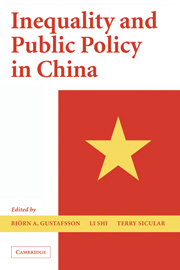Book contents
- Frontmatter
- Contents
- List of Tables and Figures
- Contributors
- Acknowledgments
- 1 Inequality and Public Policy in China: Issues and Trends
- 2 Income Inequality and Spatial Differences in China, 1988, 1995, and 2002
- 3 Growth and Distribution of Household Income in China between 1995 and 2002
- 4 Explaining Incomes and Inequality in China
- 5 The Distribution of Wealth in China
- 6 Growth, Inequality, and Poverty: A Comparative Study of China's Experience in the Periods before and after the Asian Crisis
- 7 What Has Economic Transition Meant for the Well-Being of the Elderly in China?
- 8 Inequity in Financing China's Health Care
- 9 China's Emerging Urban Wage Structure, 1995–2002
- 10 Unemployment, Earlier Retirement, and Changes in the Gender Income Gap in Urban China, 1995–2002
- 11 What Determines Living Arrangements of the Elderly in Urban China?
- 12 The Impact of Village-Specific Factors on Household Income in Rural China
- 13 The Redistributive Impact of Taxation in Rural China, 1995–2002: An Evaluation of Rural Taxation Reform at the Turn of the Century
- Appendix: The 1995 and 2002 Household Surveys: Sampling Methods and Data Description
- Index
- References
5 - The Distribution of Wealth in China
Published online by Cambridge University Press: 25 July 2009
- Frontmatter
- Contents
- List of Tables and Figures
- Contributors
- Acknowledgments
- 1 Inequality and Public Policy in China: Issues and Trends
- 2 Income Inequality and Spatial Differences in China, 1988, 1995, and 2002
- 3 Growth and Distribution of Household Income in China between 1995 and 2002
- 4 Explaining Incomes and Inequality in China
- 5 The Distribution of Wealth in China
- 6 Growth, Inequality, and Poverty: A Comparative Study of China's Experience in the Periods before and after the Asian Crisis
- 7 What Has Economic Transition Meant for the Well-Being of the Elderly in China?
- 8 Inequity in Financing China's Health Care
- 9 China's Emerging Urban Wage Structure, 1995–2002
- 10 Unemployment, Earlier Retirement, and Changes in the Gender Income Gap in Urban China, 1995–2002
- 11 What Determines Living Arrangements of the Elderly in Urban China?
- 12 The Impact of Village-Specific Factors on Household Income in Rural China
- 13 The Redistributive Impact of Taxation in Rural China, 1995–2002: An Evaluation of Rural Taxation Reform at the Turn of the Century
- Appendix: The 1995 and 2002 Household Surveys: Sampling Methods and Data Description
- Index
- References
Summary
Introduction
China's reform and openness have now been ongoing for a quarter century. During this important period, while China's economy has developed rapidly and personal incomes have increased, changes in income distribution, especially rising income inequality, have raised social concerns. Income and wealth are closely correlated. The people's well-being depends not only on incomes but also on the level and distribution of wealth (Schneider 2004, pp. vii, 6). Since 1990 China has experienced a period of rapid accumulation of personal wealth combined with unequal distribution of that wealth. The country has established the objective of constructing a well-off society. The issue of wealth distribution thus has become a new focus of concern.
In this chapter wealth, also called property or assets, includes land, housing, and individual savings or holdings of other financial instruments, among other factors. Here the terms wealth, property, and assets are used as synonyms, but in different ways and from different points of view. When we link these assets with ownership we use the term “property rights.”
Wealth and income are different concepts. Here income refers to all earnings of a person or a household in a certain period of time (usually a year). Wealth refers to the net monetary value of all assets at a certain point of time. In other words, wealth is the stock of all property at a certain point, while income is a flow of earnings in a time period. Obviously, income and wealth are interrelated.
- Type
- Chapter
- Information
- Inequality and Public Policy in China , pp. 118 - 144Publisher: Cambridge University PressPrint publication year: 2008
References
- 1
- Cited by



